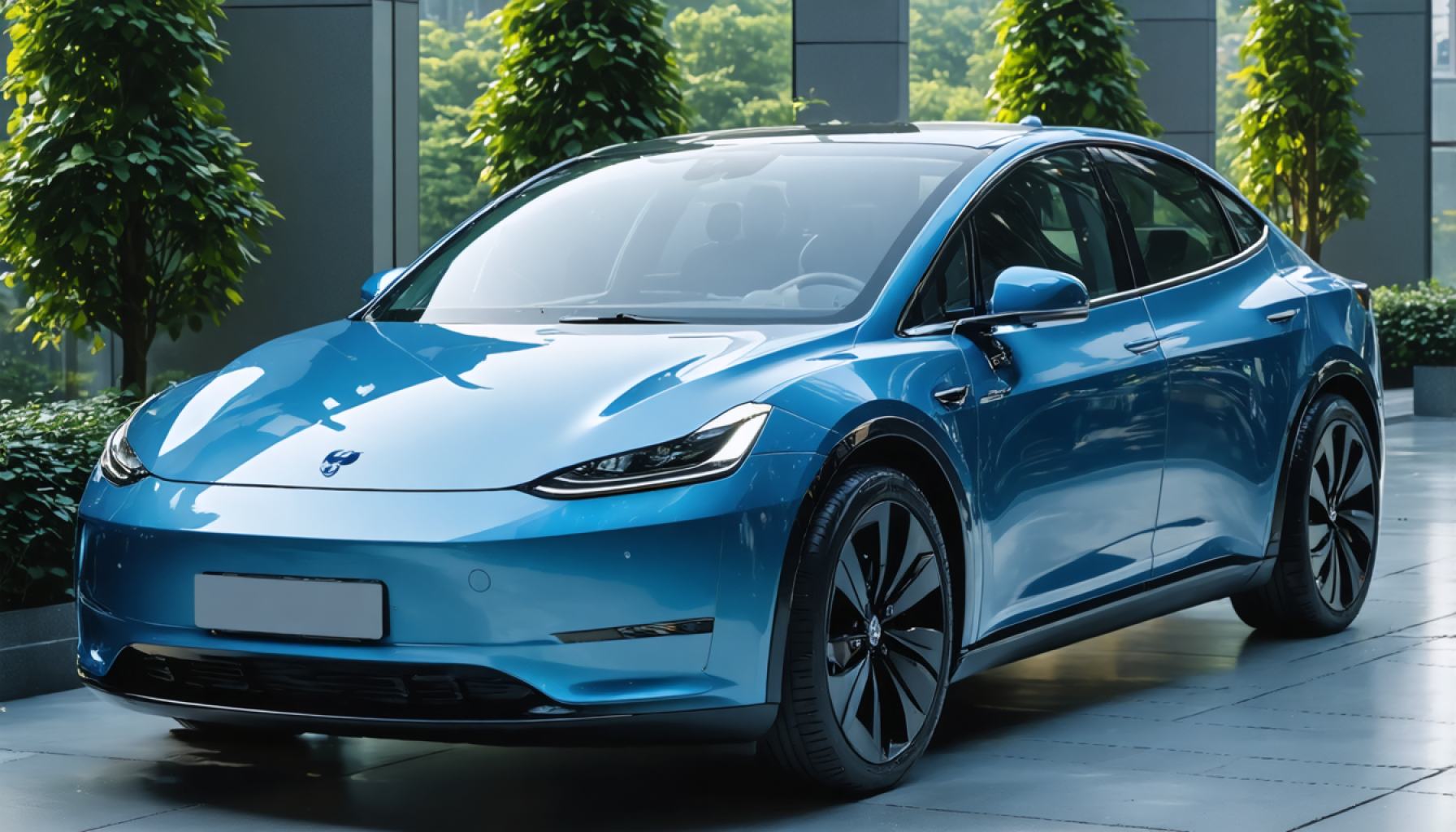- Chinese automakers are making significant inroads into the U.K. market, quickly gaining popularity with their affordable and high-tech electric vehicles (EVs).
- In contrast, Chinese EVs face a 100% import tariff in the U.S., prompting manufacturers to focus on more welcoming markets like the U.K.
- The U.K.’s open approach has facilitated the entry of brands like XPeng, Leapmotor, Omoda, Jaecoo, and BYD, with new retail locations expanding rapidly across the country.
- BYD plans to launch its luxury sub-brand, Denza, in the U.K. by 2026, further showcasing the strategic global expansion of Chinese EV makers.
- This shift in automotive market dynamics reflects a broader trend towards cooperative economic diplomacy as geopolitical tensions influence global trade.
Electric vehicles (EVs) have become the centerpiece of a rapidly shifting global market, and nowhere is this evolution more evident than in the rise of Chinese automakers. As the United States erects a tariff barricade against Chinese EVs, the U.K. welcomes them with open arms, turning British roads into showgrounds for the latest in automobile innovation from the East.
Picture this: the quaint, cobblestone streets of London now shared with the sleek, futuristic silhouettes of XPeng and Leapmotor vehicles. These brands, previously unknown to the British public, are making swift inroads, meeting a pent-up demand for affordable, high-tech electric mobility. Seventy dealerships across the region have embraced Omoda and Jaecoo vehicles, two Chinese sister brands known for their prowess in design and technology, reaching sales in the thousands and spawning a new wave of urban sophistication.
In stark contrast to the welcoming embrace of the U.K., the United States remains an impenetrable fortress for Chinese EVs, wielding a 100% import tariff like a cudgel. This has prompted a strategic pivot for Chinese automakers, redirecting their transcontinental ambitions toward nations with a more amicable trade outlook. Hence, the remarkable ascent in the U.K., where BYD’s iconic buses are already part of the public transit tapestry.
The British market, often considered conservative with a penchant for established marques, is proving fertile ground for Chinese innovation. Leapmotor’s showroom debut in March was soon shadowed by XPeng, both makers eager to motivate a green shift in the automotive psyche of the British public. With dozens of new retail locations slated for launch by year-end, these Chinese players aim to capture an even larger slice of the electric pie.
BYD, not content with city buses, is poised to release its luxury sub-brand Denza by early 2026, enhancing the allure of Chinese EVs with upper-echelon offerings. Their strategic maneuvering exemplifies a grand chess game of economic relations, where the stakes are nothing short of transforming how we experience transportation.
Yet, all this is unfolding against a backdrop of geopolitical apprehension. With continental Europe not immune to trade winds, the EU contemplates shifting strategies, moving away from their own high tariffs toward mutually beneficial agreements. As the glimmers of detente in the EU elucidate, minimum price deals may replace hardline tariffs, signaling a shift towards cooperative economic diplomacy.
The takeaway is clear: where barriers are built, doors of opportunity open elsewhere. Keen to nurture a renaissance in sustainable transport, the U.K. is shrewdly capturing the gains of this global pivot. Ultimately, the story of Chinese EVs in the U.K. is one of untapped potential and adaptable savvy, a narrative that symbolizes the dynamic reimagining of global trade relationships in today’s electrified era.
Why Chinese Electric Vehicles Are Taking the U.K. by Storm: A Deep Dive
The rise of Chinese electric vehicles (EVs) in the U.K. reflects a dynamic shift in the global automotive market. As these innovative vehicles increasingly populate British roads, several key factors contribute to their burgeoning presence:
Comprehensive Market Insight
1. Market Forecasts & Industry Trends: The global EV market is expected to grow significantly, with the U.K. leading in Europe due to its progressive environmental policies. As per a report from Allied Market Research, the global EV market size is anticipated to reach $802.81 billion by 2027, growing at a CAGR of 22.6% from 2020 to 2027.
2. Chinese Brands’ Strategic Positioning: Chinese automakers like BYD, XPeng, and Leapmotor are capitalizing on the U.K.’s openness to green technology, strategically increasing their dealership networks to meet the growing demand. According to McKinsey & Company, these companies are leveraging their cost-competitive production and advanced tech to offer affordable yet high-tech vehicles, a crucial factor enticing British consumers.
Controversies & Limitations
3. Geopolitical Challenges: Despite the open market in the U.K., Chinese EV brands face challenges in regions like the U.S. due to high tariffs. This geopolitical tension underlines the contrasting trade policies worldwide, impacting market entry strategies for these companies.
4. Perception & Reliability: Some consumers remain skeptical about the longevity and reliability of new market entrants compared to established automotive brands. However, surveys indicate increasing consumer confidence as these brands demonstrate their commitment to quality and innovation.
Pros & Cons Overview
5. Advantages:
– Affordability: Lower production costs result in more competitively priced vehicles.
– Technology: Advanced features like AI integration and autonomous driving capabilities.
– Sustainability: Commitment to eco-friendly manufacturing processes and materials.
6. Disadvantages:
– Service Infrastructure: Limited service stations and parts availability compared to established brands.
– Brand Recognition: Emerging brands still need to build strong recognition and trust in a new market.
Security & Sustainability
7. Innovative Sustainability Practices: Chinese EV manufacturers consistently push the envelope by using sustainable manufacturing processes. XPeng, for instance, emphasizes using recycled materials and reducing carbon footprints, enhancing their appeal to environmentally-conscious consumers.
Real-World Use Cases
8. Urban Mobility: With compact designs and advanced tech features, vehicles like XPeng’s models serve urban dwellers’ transportation needs efficiently. Their compatibility with a sustainable lifestyle makes them ideal for urban settings where environmental legislation is stringent.
Actionable Recommendations
For consumers considering a Chinese EV:
– Research thoroughly: Investigate the model’s features and read customer reviews to understand the vehicle’s performance and reliability.
– Assess local infrastructure: Ensure there are sufficient charging stations and servicing options in your area.
– Consider the long-term savings: While initial costs may be appealing, examining the vehicle’s long-term operational efficiency is crucial.
For investors and automotive enthusiasts, keeping an eye on these brands’ expansions offers insights into emerging market trends and future opportunities.
Conclusion
Chinese EVs like those from BYD, XPeng, and Leapmotor are reshaping the automotive landscape in the U.K., as they present compelling alternatives to traditional vehicles. They not only align with global sustainability goals but also offer cutting-edge technology at affordable prices. As geopolitical dynamics continue to evolve, the global market for electric vehicles will continue to see innovation and growth—advancements primed for those ready to embrace change.
For further reading, visit BYD’s website.







